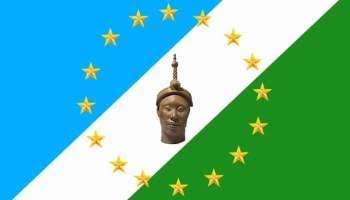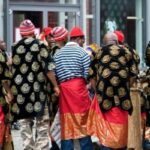The June 12th 1993, presidential election was cancelled mid-way through the announcement of the results just at the moment when it had become clear that M. K. O. Abiola, a Yoruba Muslim had won a landslide victory over Bashir Tofa, a Kano Hausa/Fulani. Even if the truth of the matter was that the then Head of State, General Babangida was a dictator who wanted to rule forever, the Yoruba and indeed, the Southern elite interpreted the event as a Hausa/Fulani plot to keep them out of power.
The elections themselves were considered relatively free and fair and a good opportunity to start rebuilding confidence in the Nigerian nation-state. The cancellation however led to strong ethnic and regional fears that the Hausa/Fulani ruling class were not going to allow a Southerner to rule, even if he wins a democratic election. The press in the preceding years had led a successful media campaign the main tenet of which was that the Hausa/Fulani will always sacrifice democratisation to maintain themselves in power. It was a litmus test for the Hausa/Fulani and through the instrumentality of Babangida, they failed the test.
I t was in that context that the future survival of Nigeria was anchored in what came to be known as power shift. At that time, it was defined as the imperative of a southerner emerging as Nigeria’s President. The argument, according to Charles Ibiang (Thisday, 11/2/99) was that out of the twelve Heads of State Nigeria has had, only four were from southern Nigeria and that the southern rulers were in power for only six, of the thirty- eight years that the country has been independent up to that point. According to Alex Ekwueme, former Vice President during the Second Republic (Guardian, 26/1/99), the term was invented as an alternative to the concepts of zoning and rotation which had dominated the National Constitutional Conference of 1994-95. Section 229 of the 1995 Draft Constitution had stipulated that the Presidency should be rotated between the North and the South, Gubernatorial power rotated between the three Senatorial districts in each state and the Chairmanship of local governments between three zones to be created in each of them. These constitutional proposals were however completely discredited when it became clear that General Abacha was going to continue as “elected President” and that the zoning was therefore going to start from the North, the region that had monopolised power for a long time. The term Yoruba race was invented following the decision of General Abacha to perpetuate a self-succession strategy after Babangida stepped aside following the annulment of the Abiola victory. Elected President M.K.O. Abiola was detained for four years, until his death in July 1998. Other Yoruba leaders such as the then former and future Head of State General Olusegun Obasanjo was also in jail. Over thirty people were accused of plotting a coup in March 1995 and sentenced to long jail terms. In March 1997, treason charges were filed against leading opposition leaders in exile: They included Professor Wole Soyinka, Nigeria’s Nobel Laureate, Chief Anthony Enaharo and General Alani Akinrinade of NADECO. On 21st December 1997, the regime announced the arrest of
its second in command, General Diya and many other senior officers who were tried for treason and were about to be executed when Abacha suddenly died. Many politicians such as Bola Ige and Abubakar Rimi, Second Republic Governors of Oyo and Kano states, Senator Lam Adesina, Comrade Ola Oni, Alhaji Sule Lamido, Olu Falae and so on were also detained or imprisoned. Human rights activists such as Olisa Agbakoba, convener of United Action for Democracy, Beko Ransome Kuti and Segun Maiyegun of the Campaign for Democracy, Chima Ubani of the Civil Liberties Organisation, and Femi Falana of the CDHR suffered the same fate. Numerous trade unionists, journalists, religious leaders, army officers, even Nigerian ambassadors abroad were all detained for disloyalty to Abacha. Abacha led a general campaign of terror against democrats and human rights defenders but the Yoruba were the core group that was targeted, after all, the key issue was the stolen mandate of the Yoruba President elect – Abiola.
I knew the Yoruba race had been born because as a civil society activist, I was on the frontlines in the struggle against military dictatorship of the Babangida and Abacha juntas with my Yoruba colleagues in Campaign for Democracy (CD) and later, Democratic Alternative (DA) when the accusations started coming against “you Hausa/ Fulani”. Suddenly, the Comrade Jibo that I was had to confront the direct accusation – “why won’t you Hausa Fulani allow a Yoruba man to rule”? June 12 was indeed a very painful period for all of us activists but also for the others. For the core Hausa/Fulani political class, the message was clear and understood, for Nigeria to survive, the Yoruba must be allowed to rule Nigeria and the “pacted” transition of 1999 was sealed and delivered.
On 27th February 1999, Presidential elections were held witnessed by 10,700 observers. There were only two candidates, former military Head of State, General Obasanjo and former Secretary to the Military Government of General Babangida, Olu Falae. The two candidates were Yoruba and they were products of the “pacted” transition following the consensus within the political class that there should be a “power shift” from the North to the South of the country and within the South; it was the turn of the Yoruba.
he fact of the matter however was that neither M.K.O. Abiola nor Olusegun Obasanjo had the hearts and minds of the Yoruba race. Both were chosen for them by the others and the person they chose for themselves and believed in was Obafemi Awolowo. Indeed, the Yoruba question in Nigerian politics is summarised by the life of Obafemi Awolowo, a long, organised and determined attempt to occupy the summit of the Nigerian political hierarchy culminating in failure. A failure that becomes certified as “gospel” truth with the success of Abiola in the June 12th elections and the annulment of the election results by the Babangida Military Junta. The Yoruba political elite have a long list of grievances against the Northern political establishment. They include suspicions of rigging in all the elections that Awolowo had lost, Federal interference in the Action Group crises and imposition of a state of emergency and Federal power over the West in the 1960s, creation of the Mid West, which whittled down the territory under direct Yoruba control etc.
By October 1983, the Yoruba political elite within the Unity Party of Nigeria were so frustrated by the defeat of Awolowo, their leader that they started once again seriously considering the secession option

 Join Daily Trust WhatsApp Community For Quick Access To News and Happenings Around You.
Join Daily Trust WhatsApp Community For Quick Access To News and Happenings Around You.